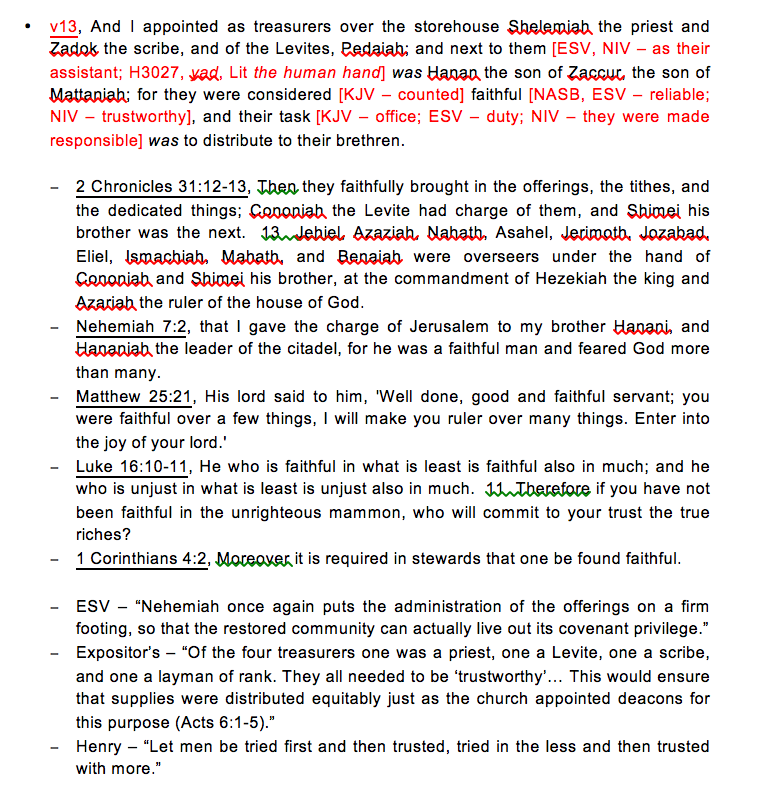Dear Sovereign Redeemer and other friends,
The first stop on the road to preparing a sound, expository sermon should definitely be the Bible work. Once that has been given lavish attention, there is most certainly a place for consulting a variety of sources about the text. God has given tremendous insight into His word to various ones throughout the centuries, and we are well served to consult them, especially in areas of difficultly or controversy. Exclusively trusting our own insights is the height of arrogance and folly.
Let’s divide our consideration into two categories: study Bibles and commentaries.
Study Bibles
I prefer to start by reading through the notes of multiple study Bibles, since the content in a study Bible is by nature limited and more high level. A study Bible helps unpack the meaning of a text without going into extreme detail, and when several are consulted, a number of different perspectives emerge.
Here are the four that I consult on a weekly basis, usually in this order:
- Nelson’s NKJV Study Bible. My Nelson is the most basic of the four, and I don’t mean that in a negative way at all. It consistently provides straightforward, right-down-the-middle explanations, which is a great way to start the extended study of any Scripture text.
- The ESV Study Bible. This one is probably my favorite, though not making the others dispensable by any stretch. I do love the maps and pictures which are sprinkled throughout.
- The MacArthur Study Bible. Compiled by arguably the best Bible expositor of our lifetime, I almost always find something extremely valuable in these notes. I wouldn’t think of not consulting Dr. MacArthur’s notes during my preparations.
- The Reformation Heritage KJV Study Bible. Released just last year (2014), this offering by Joel Beeke and crew is a welcome addition. The notes are the most consistently Reformed of the four, and I normally benefit from the “Thoughts for Personal/Family Worship” section which concludes every chapter.
At the time of this post, all four of these study Bibles can be acquired for a total of just in excess of $100, so the costs aren’t prohibitive at all.
The genius of these four study Bibles is found in the distinctions. They are different enough to all be indispensable in the grouping. The last thing a studying pastor should want is to sequester himself in an echo chamber with only sources which never contradict his own inclinations. Having a diversity of sources with at least slightly different perspectives is beyond a good idea. It is safe. And beginning with these more limited, summary level sources actually helps me to be ready for what comes next.
Commentaries
After having gotten my feet wet, so speak, with the study Bibles, more comprehensive commentaries then provide greater depth and breadth. They provide more information and more fully treat the difficulties and controversies in the text.
Here are a few of my favorites:
- The Expositor’s Bible Commentary. At the time of this post, this hardcover set (12 volumes; 8 Old Testament plus 4 New Testament) costs in excess of $500, so this is a significant investment, but there are two things I love about this set. First, it is reliably reliable. It has a wealth of information, and the viewpoints advanced are consistently sound. Secondly, it is very broad, providing visibility to even unsound viewpoints and scholarship, though only advancing what is sound. As a preacher, I need to be aware of the false interpretations being advanced by professing Christian scholars, so that I can proactively teach against these false doctrines when necessary. This commentary set also makes me aware of modern scholarship, since my preferred commentators are normally brothers from bygone centuries.
- Matthew Poole. Several years ago I stumbled across a quote from J.C. Ryle, my favorite author, where he commended Matthew Poole as the preeminent English Bible commentator. Since Poole was the favorite of my favorite, I said, “I have to get that!” And I haven’t been disappointed. Matthew Poole is rigidly exegetical, sticking to commenting on the words of the text, and articulately concise, getting to the point and saying it well in an amazingly few words. If you only had 15 minutest to prepare a sermon, you would want to read Poole. At a current cost of $40 for the 3-volume set, buying it makes you the big winner.
- Matthew Henry. Is anyone more quotable than Matthew Henry? I doubt it… If you are looking for incredible insight, said in a memorable way, look no further. At a current cost of about $55 for the 3-volume set, owning Henry is essential. On the weeks when I wonder if I’ll have the time to read all of my commentaries, I always scratch out the time to consult Matthew Henry.
- Various and sundry. Some of the most helpful insight on a book of the Bible is not part of a Genesis-to-Revelation set. For instance, when our church was studying 1 Peter, my most beloved commentary for that became this one by Robert Leighton, which is a one-off book on just 1 Peter, not part of any set. Suggestion: Google “the best commentary for the book of _______” (fill in the blank). A number of ranking lists will pop up, and by comparing a few of them from sources you recognize and trust, you will find some great resources. Ligonier (R.C. Sproul and team) and Tim Challies often have helpful rankings. If we only use commentary sets, we will be missing some of the best available content.
As I read the notes in the study Bibles and the content from the more comprehensive commentaries, I highlight what I find to be the most important, relevant, and insightful sentences and then put them in my study file. Here is what my study file looked like after having done that, using a sermon on Nehemiah 13:10-14 as an example:
If you want to see the whole file, you can access it here.
On an average week, this represents 3-5 hours of work.
At this point in the process, the reading I intended to do is complete. The topic of the next post will be preparation for writing the sermon.

